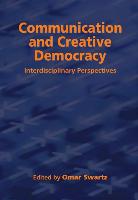The provocative chapters making up this edited volume are drawn from a range of disciplines and are intended to help scholars, activists, students, and citizens in general to rethink commonly accepted notions of community in order to imagine new possibilities for social, political, and economic organization -- in short, new ways of imagining solidarity and citizenship with others, especially those who languish outside the range of our moral radar. They demonstrate that the political philosophy of John Dewey remains important and heuristic for understanding and advancing contemporary discourses of participatory and deliberative democracy -- what the contributors explore collectively as a “creative democracy.” Graduate courses in communication, philosophy, rhetoric and composition, journalism, American studies, cultural studies, and many other areas in the humanities and social sciences can also draw on the historical, critical, and sociological aspects of the various chapters for debating the role of progressive social criticism in public life.
|
